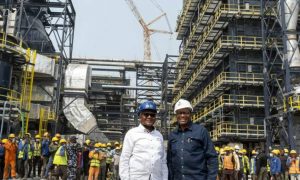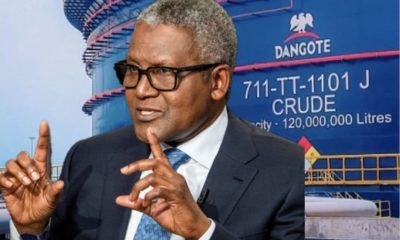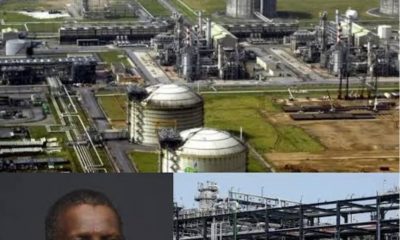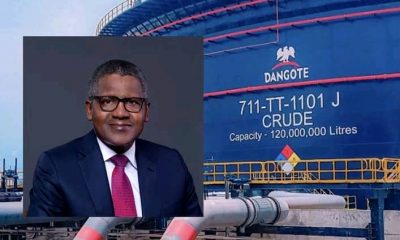Business
EXPECTATIONS ABOUT DANGOTE REFINERY INAUGURATION ARE EXTREMELY EXAGGERATED
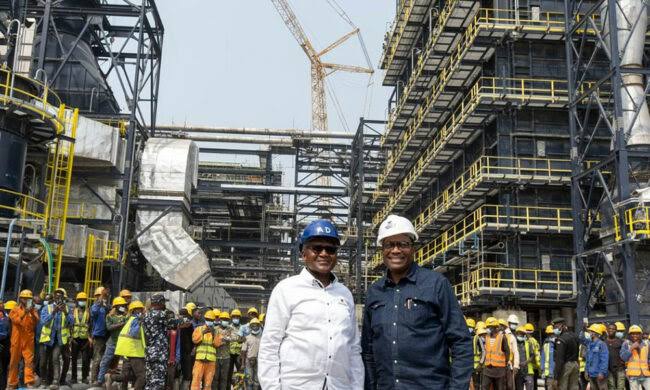
EXPECTATIONS ABOUT DANGOTE REFINERY INAUGURATION ARE EXTREMELY EXAGGERATED
From Editorial Board, Africa Oil+Gas Report
The ceremony around the planned visit by the Nigerian President to the Dangote Refinery on May 22, 2023, will peak with a cutting of the ribbon, inaugurating the 650,000 Barrels per stream Day Plant, located in the Eastern flank of Lagos, the country’s commercial city.
Everyone, it seems, look forward to the production of petroleum products from the plant after that symbolic activity.
But it will not happen.
As President Muhammadu Buhari leaves office a week after commissioning one of the largest single train hydrocarbon processing plants on the planet, he could be forgiven for believing he had had his wish to be in such a large place but technology does not sit well with politics.
The ongoing technical commissioning process has not gotten anywhere close to the point of introducing raw hydrocarbon into the plant, let alone delivering petroleum products.
One key challenge of Nigeria’s chattering classes is that they hardly look up the regulation. Hydrocarbon will be introduced only when the Nigerian Midstream Downstream Regulatory Agency (NMDPRA) approves and issues Licence To Operate the Refinery to Dangote.
Speculations about inauguration and commissioning are just, well, speculations. Both words do not appear anywhere in the Procedure to License a Refinery in the Nigerian law.
The three stages are:
License to establish a Refinery
Approval to construct Refinery
License to Operate the Refinery
Nowhere does inauguration or commissioning appear.
So the Refinery can be inaugurated or commissioned as the Licensee desires, as long as no attempt is made to operate the Refinery by introducing crude oil and make products for sale, it does not concern NMDPRA.
The claim that some “large sub-sea pipeline infrastructure connected to Oil and Gas blocks in the Niger Delta region for supply of crude feedstock” is a false narrative. What’s in the plan is that Single Point Mooring (SPM) buoys will play the transportation role in input crude delivery and output petroleum products.
We live in a society where optics trumps everything. Buhari has been president for 8 of the 9 years that the Refinery project has been on. What is wrong with Dangote asking the President to inaugurate the Refinery so his name is on the marble when the Refinery becomes fully operational? Afterall no law will be breached by such gesture?
That said, Aliko Dangote the billionaire owner of the Refinery is determined that the 19billion-dollar project, the second of his three, hydrocarbon processing mega projects (Fertilizer, Refinery and Petrochemicals) is delivered by end of 2023.
The technical work has gone far, involving trial-running every single equipment, which has taken a while because of the lengthy time of construction. Some equipment were installed six years ago, and were just standing there in the air, water or even underground. Anything, literally could have happened.
As of February 2021, the installation of the Crude Distillation equipment had been completed. So had the kitting up of the Residue Fluid Catalytic Cracking Unit (RFCCU).
Supply chain challenges thrown up by the COVID-19 did slow down work, but the construction of Africa’s largest hydrocarbon processing factory picked up steam again in mid-2021.
“The electrical and instrumentation works are usually invisible to the gaze of non-refinery workers, but they are key. Their installation needed extreme care and it consumes over 30% of the Refinery construction time,” say several managers familiar with the project.
“A lot of our contractors are Chinese. Those who went home couldn’t come back quickly, but the project workflow recovered and those installations especially that of the Crude Distillation Column, which arrived Nigeria in December 2019 were expedited.
“We will have 15 process units in the Refinery and they must all work together” the managers tell us.
The operations planning will emphasize the mantra at the commissioning: we must flow everything out with air, then do it with water, then with steam, them with air again”. This is all to ensure that the likelihood of moisture absorption is zero, as the contrary will lead to cracks.
“The equipment must be pickled. What that does is that it oxidizes the facility”. The Dangote Refinery is significantly an Indian supervised operation.
But a significant percentage of the 1,000 Nigerian engineers sent to training in India for the eventual operations of the facility, have returned and are currently engaged on site.
The relationship between the Nigerian crude oil refining sector and Indian engineering expertise goes back to 1988, when the second (larger) refinery in Port Harcourt, the major city in the country’s oil producing Delta region was being constructed.
“Some of the experts working on Operations Planning were part of the construction of the Port Harcourt Refinery 35 years ago”, our sources say.Mr Dangote initially announced the likelihood of the project in 2013. But it was at the All-Convention Luncheon at the Annual Conference of the Nigerian Association of Petroleum Explorationists NAPE, in November 2014 that he provided the first relatively comprehensive details of the facility. He told the roomful of geoscientists that the capacity had increased from 500,000 BSPD to 650,000 BSPD.
Dangote Industries was advised by Jacobs Engineering and it licensed the Honeywell UOP for the basic engineering design. On a daily basis, the facility will have the capacity to produce 59million liters of gasoline, 20million litres of kerosene and 9million litres of diesel and others.
The construction has taken a while and has been the most excruciating economic challenge Nigeria has ever faced. Would Dangote Industries have delivered this project much earlier if it had awarded it to a world- class EPC contractor like Bechtel, TechnipFMC, Siemens, KBR?
“Yes”, said Alex Ogedengbe, a retired Group Executive Director at NNPC who was involved in the construction of the Warri and Port Harcourt Refineries in the 1980s. “There are just about six or seven such EPC contractors in the world,” he explained. Mr Ogedengbe was speaking at a private webinar organized by oil and gas analyst, Ronke Onodeko in April 2020.
Dangote sources maintain that the cost would have been at least 30% higher if that route had been taken. And while it could be argued that Dangote Industries could have had good value for money if a Bechtel or KBR had handled the construction, multiple sources argue that the delay could have been minimized if the current structure had been in place since inception. The company went into this project with the mindset of constructing a cement plant, which was its major competence before this huge assignment. “We wasted the most time at the engineering stage”, one manager recalls. “A reputable EPC contractor would still have hired expertise from outside like we are doing and subcontract several units. Dangote Industries bought brand new equipment for this work; an EPC contractor might not have even done that, but it would have coordinated things better at the outset.”
One more advantage of building it yourself: all the equipment you purchase for logistics and construction purposes are yours.
Everyone we spoke to agreed that things began to take very good shape when Giuseppe Surace came along. The Italian engineer who had been Chief Executive of Saipem in Nigeria and Brazil, joined the project in June 2017 as the Chief Operating Officer. “On the factory floors, in the Executive Offices, everywhere on site, the consensus is that one of the best decisions that Aliko Dangote made was Surace’s appointment. “He saved the project” said our sources.
A highlight of the swirling speculations around President Buhari’s impending visit is the description of how crude oil will be pumped into the Refinery. One widely circulated message talks of large sub-sea pipeline infrastructure connected to Oil and Gas blocks in Niger Delta region for supply feedstock “.
This is a false narrative.
The truth is that Single Point Mooring SPM buoys will play a huge role in input crude delivery and output petroleum products. There are three of them either way. Three SPMs will deliver the input crude oil from vessels into a jetty from which it is pumped into the plant. And three SPMs will ferry petroleum products out to vessels on the sea for export. “We have facility to evacuate through roads, we have large loading capacity (103 loading terminals) and we can evacuate 75% of our production through road and we can evacuate 75% of our production through the sea so that if we want to export”, Dangote officials have repeatedly explained.Within Nigeria, we can evacuate to Warri, Port Harcourt, Calabar and so on, those options are available”, the officials say.
On the table is the idea of a 6-lane road through Epe, a town in the east of Lagos. But what of the supply of the product to Lagos? Will some of it be through Lekki Expressway? The subject of the quality of Nigerian roads to take in the products, through land tankers is still a fraught one.
Editorial, Oil+Gas Report
Business
Nigeria’s Inflation Drops to 15.10% as NBS Reports Deflationary Trend

Nigeria’s headline inflation rate declined to 15.10 per cent in January 2026, marking a significant drop from 27.61 per cent recorded in January 2025, according to the latest Consumer Price Index (CPI) report released by the National Bureau of Statistics.
The report also showed that month-on-month inflation recorded a deflationary trend of –2.88 per cent, representing a 3.42 percentage-point decrease compared to December 2025. Analysts say the development signals easing price pressures across key sectors of the economy.
Food inflation stood at 8.89 per cent year-on-year, down from 29.63 per cent in January 2025. On a month-on-month basis, food prices declined by 6.02 per cent, reflecting lower costs in several staple commodities.
The data suggests a sustained downward trajectory in inflation over the past 12 months, pointing to improving macroeconomic stability.
The administration of President Bola Ahmed Tinubu has consistently attributed recent economic adjustments to ongoing fiscal and monetary reforms aimed at stabilising prices, boosting agricultural output, and strengthening domestic supply chains.
Economic analysts note that while the latest figures indicate progress, sustaining the downward trend will depend on continued policy discipline, exchange rate stability, and improvements in food production and distribution.
The January report provides one of the clearest indications yet that inflationary pressures, which surged in early 2025, may be moderating.
Bank
Alpha Morgan to Host 19th Economic Review Webinar

Alpha Morgan to Host 19th Economic Review Webinar
In an economy shaped by constant shifts, the edge often belongs to those with the right information.
On Wednesday, February 25, 2026, Alpha Morgan Bank will host the 19th edition of its Economic Review Webinar, a high-level thought leadership session designed to equip businesses, investors, and individuals with timely financial and economic insight.
The session, which will hold live on Zoom at 10:00am WAT and will feature economist Bismarck Rewane, who will examine the key signals influencing Nigeria’s economic direction in 2026, including policy trends, market movements, and global developments shaping the local landscape.
With a consistent track record of delivering clarity in uncertain times, the Alpha Morgan Economic Review continues to provide practical context for decision-making in a dynamic environment.
Registration for the 19th Alpha Morgan Economic Review is free and can be completed via https://bit.ly/registeramerseries19
It is a bi-monthly platform that is open to the public and is held virtually.
Visit www.alphamorganbank to know more.
Business
GTBank Launches Quick Airtime Loan at 2.95%

GTBank Launches Quick Airtime Loan at 2.95%
Guaranty Trust Bank Ltd (GTBank), the flagship banking franchise of GTCO Plc, Africa’s leading financial services group, today announced the launch of Quick Airtime Loan, an innovative digital solution that gives customers instant access to airtime when they run out of call credit and have limited funds in their bank accounts, ensuring customers can stay connected when it matters most.
In today’s always-on world, running out of airtime is more than a minor inconvenience. It can mean missed opportunities, disrupted plans, and lost connections, often at the very moment when funds are tight, and options are limited. Quick Airtime Loan was created to solve this problem, offering customers instant access to airtime on credit, directly from their bank. With Quick Airtime Loan, eligible GTBank customers can access from ₦100 and up to ₦10,000 by dialing *737*90#. Available across all major mobile networks in Nigeria, the service will soon expand to include data loans, further strengthening its proposition as a reliable on-demand platform.
For years, the airtime credit market has been dominated by Telcos, where charges for this service are at 15%. GTBank is now changing the narrative by offering a customer-centric, bank-led digital alternative priced at 2.95%. Built on transparency, convenience and affordability, Quick Airtime Loan has the potential to broaden access to airtime, deliver meaningful cost savings for millions of Nigerians, and redefine how financial services show up in everyday life, not just in banking moments.
Commenting on the product launch, Miriam Olusanya, Managing Director of Guaranty Trust Bank Ltd, said: “Quick Airtime Loan reflects GTBank’s continued focus on delivering digital solutions that are relevant, accessible, and built around real customer needs. The solution underscores the power of a connected financial ecosystem, combining GTBank’s digital reach and lending expertise with the capabilities of HabariPay to deliver a smooth, end-to-end experience. By leveraging unique strengths across the Group, we are able to accelerate innovation, strengthen execution, and deliver a more integrated customer experience across all our service channels.”
Importantly, Quick Airtime Loan highlights GTCO’s evolution as a fully diversified financial services group. Leveraging HabariPay’s Squad, the solution reinforces the Group’s ecosystem proposition by bringing together banking, payment technology, and digital channels to deliver intuitive, one-stop experiences for customers.
With this new product launch, Guaranty Trust Bank is extending its legacy of pioneering digital-first solutions that have redefined customer access to financial services across the industry, building on the proven strength of its widely adopted QuickCredit offering and the convenience of the Bank’s iconic *737# USSD Banking platform.
About Guaranty Trust Bank
Guaranty Trust Bank (GTBank) is the flagship banking franchise of GTCO Plc, a leading financial services group with a strong presence across Africa and the United Kingdom. The Bank is widely recognized for its leadership in digital banking, customer experience, and innovative financial solutions that deliver value to individuals, businesses, and communities.
About HabariPay
HabariPay is the payments fintech subsidiary of GTCO Plc, focused on enabling fast, secure, and accessible digital payments for individuals and businesses. By integrating payments and digital technology, HabariPay supports innovative services that make everyday financial interactions simpler and more seamless.
Enquiries:
GTCO
Group Corporate Communication
[email protected]
+234-1-2715227
www.gtcoplc.com
-

 celebrity radar - gossips6 months ago
celebrity radar - gossips6 months agoWhy Babangida’s Hilltop Home Became Nigeria’s Political “Mecca”
-

 society6 months ago
society6 months agoPower is a Loan, Not a Possession: The Sacred Duty of Planting People
-

 society5 months ago
society5 months agoReligion: Africa’s Oldest Weapon of Enslavement and the Forgotten Truth
-

 news6 months ago
news6 months agoTHE APPOINTMENT OF WASIU AYINDE BY THE FEDERAL GOVERNMENT AS AN AMBASSADOR SOUNDS EMBARRASSING

